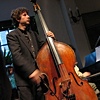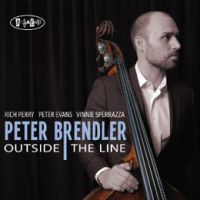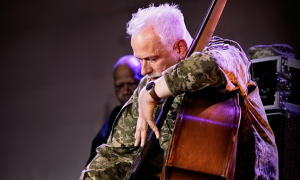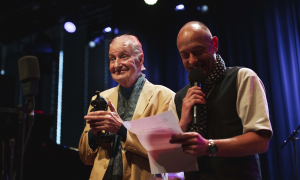Home » Jazz Articles » Profile » EJ Park: Touching Us Softly with Her Song
EJ Park: Touching Us Softly with Her Song

She gets moving. Bold, and with a taste for adventure, Park throws herself into her work and studies, starts getting some gigs, and soon people start noticing her. They hear the simplicity and beauty of her singing. They see her dedication to the music. They are moved by the way she turns a unique phrase on an old standard. Says Park, "You have to know what you want to do in life and persist at it. I listened to an African American jazz singer on television, and from that moment I knew that's what I wanted to do. I have to be strong and be the best I can be."
The singer on TV in South Korea was the great

Cassandra Wilson
vocalsb.1955
Park was early introduced to music. Born three years after the 1980 democratic uprising in her home city, and while there was still tension in the air, Park recalls that "My mother sheltered me from the violence I saw on the streets. But she and my father really loved to listen to music. Every morning, my father played records: jazz, classical pieces. Then my mother took me to a pianist for lessons, so I learned classical piano when I was five years old."
A prodigious talent, she gradually found herself gearing up to be a concert pianist. But, in college at Jeonnam National University, she found herself increasingly dissatisfied with the straight-ahead discipline of classical performance, longing for ways to creatively express her inner feelings, and acquiring a taste for singing. Only at her mother's urging did she complete her piano studies, doing so with panache. But that epiphany from listening to Cassandra Wilson stuck with her, and she sought the guidance of Malo, a Korean jazz singer who recommended she enroll at the Dong-Ah Institute for Media and the Arts (DIMA) for jazz studies. Soon thereafter she found an inspiring teacher,

Sunny Kim
vocals
Roswell Rudd
trombone1935 - 2017
In the two plus years since then, Park completed her masters and was instantly hired as adjunct vocal faculty, joining the likes of Anne Sciolla and

Mary Ellen Desmond
vocalsSensing her enormous talent, her teacher and mentor, pianist

Don Glanden
pianob.1951

Bruce Kaminsky
bassThere are two basic ways for a vocalist to transform a tune into a living jazz performance. One is to embellish it with scat and variations, twists, and turns of the words, inflections, melody, and chords.

Ella Fitzgerald
vocals1917 - 1996

Chet Baker
trumpet and vocals1929 - 1988

Billie Holiday
vocals1915 - 1959

Shirley Horn
piano1934 - 2005
Take the way she does the classic "Good Morning Heartache" made famous by

Billie Holiday
vocals1915 - 1959

Bill Evans
piano1929 - 1980
When Park takes an upbeat standard like "Bye Bye Blackbird" or does a lively bossa nova twist on "You Don't Know What Love Is," you hear her precise yet laid back mastery of the jazz idiom. The swing, the rhythmic pulsation, the holding back to make a point, with which more mature vocalists still struggle, is already "in there." She's mastered these nuances without resorting to the "jive" concoctions that some singers consider their "signature." Park takes the tune on its own terms, makes it speak for itself, and, as a listener, you end up forgetting time and place, absorbed in the song. In that respect, she's like one of her favorite instrumentalists, saxophonist Paul Desmond, who compared his sound to a dry martini. With Park, as with Paul Desmond, you get it straight up, but you become intoxicated.
UArts vocalist and professor Justin Binek summed up Park's diverse talents as follows: "Her ability to switch between slow and bluesy ballads, up-tempo bebop tunes, Brazilian bossa novas, and wordless contemporary jazz instrumentals is extraordinary. She combines an incredible theoretical knowledge with her beautiful melodic sensibilities."
So, what's on tap for this gem of a vocalist, who is already working the circuit and having a strong impact on her peers, sidemen, and growing fan base? Her own goals are modest and already being fulfilled every time she performs: "I want to talk when I sing, and make the people feel happy and help their minds heal. I want to touch their minds with my singing." Her audiences and varied sidemen will guide her into new territories and musical adventures, bringing out aspects of her singing she didn't even know were there. With all that may come frustration, problems of fame and money, perhaps even manipulation and seduction by agents and record companies. There has hardly been a great jazz singer who hasn't gone down those rough roads. But Park, like Ella Fitzgerald and Cassandra Wilson, seems to have an emotional maturity and resilience that will carry her through untainted by these vicissitudes.
Photo Credit: Hyun Ho Lee
Tags
EJ Park
Profiles
Victor L. Schermer
United States
Cassandra Wilson
SUNNY KIM
Roswell Rudd
Mary Ellen Desmond
Don Glanden
Paris Wine Bar
Bruce Kaminsky
Ella Fitzgerald
Chet Baker
Billie Holiday
Shirley Horn
Bill Evans
Comments
PREVIOUS / NEXT
Support All About Jazz
 All About Jazz has been a pillar of jazz since 1995, championing it as an art form and, more importantly, supporting the musicians who make it. Our enduring commitment has made "AAJ" one of the most culturally important websites of its kind, read by hundreds of thousands of fans, musicians and industry figures every month.
All About Jazz has been a pillar of jazz since 1995, championing it as an art form and, more importantly, supporting the musicians who make it. Our enduring commitment has made "AAJ" one of the most culturally important websites of its kind, read by hundreds of thousands of fans, musicians and industry figures every month.






 Buy Now
Buy Now























